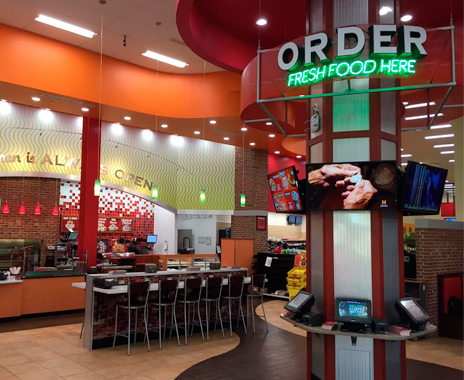Convenience stores are increasingly taking a larger slice out of the quick-serve pie with fresh food offerings. It’s become such a lucrative business for C-stores that Sheetz, the Pennsylvania-based C-store chain that this week opened its 500th location, is planning stores designed more as fast casuals, sans gas pumps.
Fresh off of opening store No. 500 in Thomasville, North Carolina, Sheetz is getting ready to unveil a new fuel-free concept near the campuses of West Virginia University and Penn State University. These two locations will focus more on fast-casual dining options with made-to-order foods and a beer cave.
“We were starting to sell more and more food, and at some point you’re limiting how much you can sell if everyone has to take it with them and eat it in their car or eat it at home,” says Joe Sheetz, CEO.
The fuel-free stores will account for only a small part of the brand’s expansion and will be concentrated in areas where market penetration is difficult. Sheetz says the company has committed to including a dining area in every new location, adding that existing locations will slowly upgrade to include seating, as well.
Beyond creating an atmosphere that invites guests to stay, Sheetz—like many limited-service operators—is pushing the menu toward customizable, quality foods.
“Customization is more primary to our menu than recipes are, and I think people are gravitating toward that,” says chef Dan Coffin, who has served as culinary development director for Sheetz since 2010.
The brand’s array of made-to-order sandwiches, hot dogs, burritos, burgers, and more is the culmination of a long-standing plan. Coffin says the entire organization has been keeping an eye on food development and has incrementally moved in that direction for several years.
Sheetz says this shift toward foodservice isn’t out of the ordinary; the family-owned business has been in the food industry since his great-grandfather started a dairy in the early 1900s. “We kind of came full circle because we didn’t start out as a convenience store,” Sheetz says. His uncle founded the current company in 1952. “His original store was more of a corner store. … It did a whole lot of everything. When he started out, it was a lot of food-based stuff.”
As self-service became more prevalent, the establishment added fuel pumps to its locations. In the late 1980s, Sheetz began exploring options beyond prepackaged foods.
“It has just morphed for us. The stores got bigger; the kitchens got more sophisticated; the menu got wider,” Sheetz says. “It’s been a 25-year journey since we made our commitment that we’re going to be in the food industry.”
While some C-store competitors have similarly been working toward a hybrid model that includes more fresh foods, others have only recently started diversifying, Sheetz says. He chalks it up to the competitors seeing a less-than-optimistic future in tobacco and gasoline, which have long been C-store staples.
Coffin echoes the sentiment.
“I think the entire industry is focused on foodservice,” he says. “If we’re around the corner and they’re not, [the customer is] going to come to us. My challenge is to try and make us a little more convenient because of the quality and consistency of the product.”
That convenience, Sheetz says, also extends to its versatility. The company can save consumers time by consolidating disparate items like gas, snacks, gum, and dinner in a single location.
“We sell a bunch of other stuff because we try to give the customers a one-stop shop. We do have a bunch of things that a [quick serve] won’t have,” Sheetz says. “I think it’s the typical channel blurring in every single channel of retail.”
That channel blurring is helping the C-store business. A recent survey by the International Foodservice Manufacturers Association (IFMA) and Datassential estimated that convenience stores grew by 3.8 percent in 2014, compared with limited and full-service restaurants, which were only estimated to have grown by 2.5 percent.
Customers, Coffin says, are starting to see C-stores like Sheetz more as restaurants.
“Our customers put us somewhere between [quick service] and fast casual,” he says. “We are a destination for food. [Quick serves] have had fast casual breathing down their neck, and now they have folks from the other end.”
The competition is hardly one-sided. Limited-service operators like Zöes Kitchen sell prepackaged meals and sides in addition to their made-to-order fare, while Jamba Juice stocks its POS with healthy snacks like mixed nuts and energy bars. Sheetz points to limited-service restaurants like McDonald’s and Dunkin’ Donuts that have encroached on coffee sales at fueling stations.
“Our industry may be blurring into theirs, but they’re blurring into ours,” Sheetz says.







